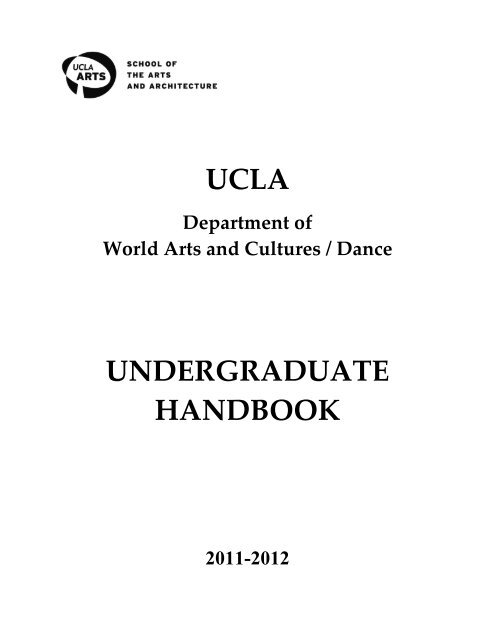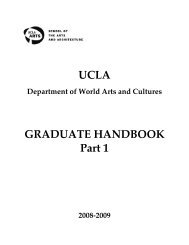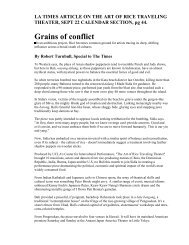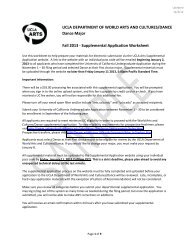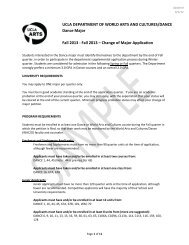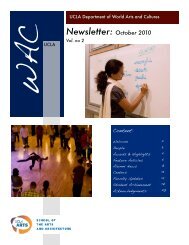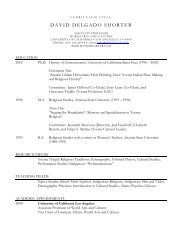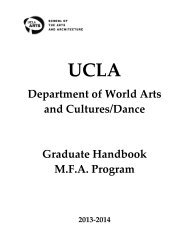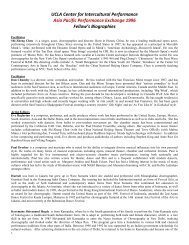campus resources - UCLA Department of World Arts and Cultures ...
campus resources - UCLA Department of World Arts and Cultures ...
campus resources - UCLA Department of World Arts and Cultures ...
You also want an ePaper? Increase the reach of your titles
YUMPU automatically turns print PDFs into web optimized ePapers that Google loves.
Welcome to the <strong>Department</strong> <strong>of</strong> <strong>World</strong> <strong>Arts</strong> <strong>and</strong> <strong>Cultures</strong>/Dance!As a new undergraduate student at <strong>UCLA</strong>, you may be unfamiliarwith departmental policies <strong>and</strong> procedures. This guide containsinformation regarding both the <strong>Department</strong> <strong>of</strong> <strong>World</strong> <strong>Arts</strong> <strong>and</strong><strong>Cultures</strong>/Dance <strong>and</strong> <strong>UCLA</strong> that will help make your transition into<strong>UCLA</strong> an easier one.Please do not hesitate to contact the WACD Student Affairs Office anytime that you need assistance.4
artistic practice <strong>and</strong> attention is given to the changing social roles <strong>and</strong> responsibilities <strong>of</strong> artistpractitioners <strong>and</strong> scholars <strong>of</strong> the arts in the U.S. <strong>and</strong> worldwide.Undergraduates <strong>and</strong> graduates have excelled in fields including technology <strong>and</strong> the arts, videography,documentary work, public service, education, theatrical/events production, performing arts, urbanplanning, law, environmental activism, public health <strong>and</strong> medicine. They have made careers incommunity non-pr<strong>of</strong>its <strong>and</strong> activist groups, government arts agencies, museums <strong>and</strong> arts foundations.Potential careers for CAP MA/PhD <strong>and</strong> Dance MFA graduates also include positions in researchuniversities <strong>and</strong> colleges <strong>and</strong> MFA graduates are active as choreographers/performers in their owncompanies or with other pr<strong>of</strong>essional organizations as well.8
VICTORIA MARKS, VICE CHAIR OF UNDERGRADAUTE AFFAIRSWelcome, new students! We are so happy that you have chosen us, <strong>and</strong> we, you! Despite the size <strong>of</strong><strong>UCLA</strong>, WACD is small; speaking for my faculty colleagues, we want to get to know you. We hope to seeyou in class, as well as at performances <strong>and</strong> other cultural events.You are the most important part <strong>of</strong> what we do here, <strong>and</strong> we look forward to meeting you, <strong>and</strong> seeingyou in action as the year unfolds. Please introduce yourself to me, <strong>and</strong> feel free to make appointments todiscuss any part <strong>of</strong> the undergraduate major.As we begin, I’d like to put one <strong>of</strong> many opportunities before you: We are looking for incoming studentsto work with faculty, to become involved in thinking about curriculum <strong>and</strong> representing studentinterests. If you think this is for you, please contact me right away at vmarks@arts.ucla.edu!Victoria Marks is a Pr<strong>of</strong>essor in the <strong>Department</strong> <strong>of</strong> <strong>World</strong> <strong>Arts</strong> <strong>and</strong> <strong>Cultures</strong>/Dance at <strong>UCLA</strong>, where shehas been teaching choreography <strong>and</strong> special projects since 1995. Marks takes a special interest in the BAprogram, where she serves as undergrad faculty advisor. In this capacity, Marks hopes to get to know all<strong>of</strong> our WACD students, building better communications, a strong student undergraduate student council,<strong>and</strong> a nationally recognized curriculum. As a choreographer, Victoria Marks creates dances for the stage,for film, <strong>and</strong> in community settings. Recent work has considered the politics <strong>of</strong> citizenship, as well as therepresentation <strong>of</strong> both virtuosity <strong>and</strong> disability. Marks is a 2005 Guggenheim Fellow <strong>and</strong> has receivednumerous grants <strong>and</strong> fellowships, including from the Irvine Foundation, National Endowment for the<strong>Arts</strong>, Los Angeles City <strong>Department</strong> <strong>of</strong> Cultural Affairs. New York State Council on the <strong>Arts</strong>, New YorkFoundation for the <strong>Arts</strong>, <strong>and</strong> the London <strong>Arts</strong> Board, among others. In 1997, Marks was honored withthe Alpert Award for Outst<strong>and</strong>ing Achievement in Choreography. She has received a FulbrightFellowship in Choreography, <strong>and</strong> numerous awards for her dance films, including the Gr<strong>and</strong> Prix in theVideo Danse Festival (1996 <strong>and</strong> 1995), the Golden Antenae Award from Bulgaria, the IMZ Award for bestscreen choreography <strong>and</strong> the Best <strong>of</strong> Show in the Dance Film Association’s Dance <strong>and</strong> the CameraFestival.9
WORLD ARTS AND CULTURES UNDERGRADUATE SOCIETY(WACUS)The <strong>World</strong> <strong>Arts</strong> <strong>and</strong> <strong>Cultures</strong>/Dance Undergraduate Society (WACUS) exists to improve the experience<strong>of</strong> undergraduates in the <strong>World</strong> <strong>Arts</strong> <strong>and</strong> <strong>Cultures</strong> major. Meetings are held informally multiple times aquarter in order to address student concerns <strong>and</strong> student generated activities. WACUS representativesare invited to attend faculty meetings <strong>and</strong> participate with the Vice Chair in addressing <strong>and</strong> respondingto undergraduate issues <strong>and</strong> concerns. WACUS is an <strong>of</strong>ficially recognized student organization. Forfurther information or to get involved, contact wac.undergraduate.society@gmail.comThis year’s WACUS reps are:Leanne Iacovetta (liacovetta@ucla.edu)Ricki Quinn (ricki.quinn@yahoo.com)Olivia Schafer (oliviaschafer15@gmail.com)Ryan Healy (rhealy1989@ucla.edu)Skye Serijan (skyeserijan@yahoo.com)If you would like to be a WACUS representative, please feel free to contact the current reps for moredetails.WACsmash!WACsmash! is an annual performing arts production that exhibits the choreographic <strong>and</strong> artistic work <strong>of</strong>undergraduate students in the <strong>World</strong> <strong>Arts</strong> <strong>and</strong> <strong>Cultures</strong> (WAC) major. The performances provide anopportunity for aspiring student choreographers <strong>and</strong> artists to cultivate leadership as producers, fostercreative <strong>and</strong> cultural explorations <strong>of</strong> various artistic medium, <strong>and</strong> provide a free-<strong>of</strong>-charge interculturallearning experience t o the <strong>UCLA</strong> community. This fully-produced setting features formal lighting,sound, costuming, <strong>and</strong> staging held with the Glorya Kaufman Dance Theater. WACsmash! is producedby the <strong>World</strong> <strong>Arts</strong> <strong>and</strong> <strong>Cultures</strong> Undergraduate Society.This year’s WACsmash! producers are:Leanne IacovettaRyan HealyIvy HurwitContact Information:WACsmash@gmail.com10
Dance Concentration(Effective Fall 2012)UnitsLower Division Requirements – Core Courses 32WAC 1 Introduction to <strong>World</strong> <strong>Arts</strong> <strong>and</strong> <strong>Cultures</strong> 5WAC 2 Lower Division Seminar 5Dance 16 Beginning Improvisation 2Dance 44 <strong>World</strong> Dance Histories 5Dance 45 Introduction to Dance Studies 4Dance 67A Theories <strong>and</strong> Methods in Dance Composition I: Languages 4Dance 67B Theories <strong>and</strong> Methods in Dance Composition II: Processes 4WAC 70 Production Practicum 2WAC 85 Sophomore Proposal 1Movement <strong>Arts</strong>/Dance Practices Requirements 36WAC 5, 55, 78, 178, Dance 6 -15, 56-65, C106A-C115,(20 units must be at the intermediate/advanced levels in two different styles, min 6 unitsupper division any genre, one genre must be modern/postmodern for a min. <strong>of</strong>6 units in Dance 65 or Dance C115.)(Max 8 units <strong>of</strong> WAC 78/178 may be applied to total 36-unit requirement.)Upper Division Requirements 35WAC 185 Junior Proposal 1Production Practices: 4Dance 169, 171, WAC 174A/B, or other WAC/D courses wWith faculty consentTopics in Dance Studies :WAC 101 5Dance C145 – 167, WAC C146 - C168, WAC 199, or outsideWAC/D with faculty consent 4Creative Inquiry/Research:Dance 117A – Theories <strong>and</strong> Methods in Dance Composition III: Locations 4Dance 117B – Theories <strong>and</strong> Methods in Dance Composition IV: Impacts 4Civic Engagement:WAC 100A, 100B or 103 5WAC 100A, 100B, 103, 144, 177SL, Dance 166, 167, oroutside WAC/D with faculty consent 4Electives:Additional units from Dance 116, 117C, WAC C180 or upper division courses 4above, or outside WAC/D with faculty consentOptional: WAC 186AB – Senior Honors Projects. Students must (10)propose a project for faculty approvalTotal required units in Dance Concentration 10311
SAMPLE SCHEDULEBelow is a sample four-year plan outlining the graduation requirements for an entering freshman pursuing theDance Concentration. Students should consult with WACD Counselor each quarter to confirm specific courseselection. Courses in BOLD PRINT should be taken the quarter indicated.FRESHMAN YEAR (54/56 units for the year, 54/56 total units)Fall (Total 16 units) Winter (Total 20-22units***) Spring (Total 18)WAC 1 (5 units) WAC 2* or Gen Ed (5 units) Dance 67B (4 units)Technique/Dance 16 ( 2 units) Dance 16 (2 units) or 67A (4 units) Technique (2 units)Technique (2 units) Technique (2 units) Technique (2 units)Gen Ed (Writing I) (5 units) Dance 44 (4 units) Dance 45 (5 units)WAC 70** (2 units) Gen Ed (5 units) Gen Ed or WAC2 (5 units)*WAC 2 is <strong>of</strong>fered every quarter covering different topics related to WAC. It is suggested that you takeWAC 2 by the end <strong>of</strong> your sophomore year.**WAC 70 is <strong>of</strong>fered every quarter. This required class <strong>of</strong>fers credit to students when they help with theproduction <strong>of</strong> a departmental performance or event. You should take this course by the end <strong>of</strong> yoursophomore year.*** To take over 20 units any quarter requires approval by The School <strong>of</strong> <strong>Arts</strong> <strong>and</strong> Architecture.NOTE: if you are planning on going abroad for part or all <strong>of</strong> your junior year, please see the WACCounselor for planning your schedule both here <strong>and</strong> abroad before entering your sophomore year.SOPHOMORE YEAR (57/59 units for the year, 111/115 total units)Fall (Total 17 units) Winter (Total 21 units***) Spring (Total 19-21***)Technique (2 units) Dance 67A or117A or 117B# (4 units) Technique (2 units)/Dan 67BDance 117A* (4 units) Technique (2 units) Technique or 117A/B (2 units)Language 1 (5 units) Gen Ed (Writing II) (5 units) Gen Ed (5 units)WAC 2* or Gen Ed (5 units) Language 2 (5 units) Gen Ed (5 units)WAC 85 (1 unit) Gen Ed (5 units) Language (5 units)JUNIOR YEAR (50/55 units for the year, 161/170 total units)Fall (Total 16-20 units) Winter (Total 16 units) Spring (Total 18-19 units)Civic Engagement or WAC101 (4/5 units) Dance 117A or B (4 units) Production Practice (4 units)Topics in Dance or Production Practice (4/5 units) WAC 185 (1 unit) Civic Engagement (4/5 units)Dance 117A or 117B# or Technique (4/2 units) Civic engagement (5 units) Upper Div. Non Major (4units)Upper Div. Non Major (4 units) Technique (2 units) Elective (5 units)Technique (2 units)Production Practice (4 units) Technique (2 units)SENIOR YEAR (38/43 units for the year – 199/213 total unitsFall (Total 11###) Winter (Total 11###) Spring (Total 16)Technique (2 units) Technique (2 units) 2 Technique classes (4units)Technique (2 units) Gen Ed (5 units) Gen Ed (5 units)Technique or Projects in WAC (2 units)Upper Div. Non Major (4 units) Technique (2 units)Gen Ed (5 units) Sr Honors Project## (5units) Sr Honors Project## (5 units)# WAC 117AB series does not have to be taken in sequence. Pre-requisites <strong>of</strong> WAC 16, 67A, <strong>and</strong> 67B must betaken (in that order) before enrolling in WAC 117A. WAC 117A is NOT a prerequisite for WAC 117B.## Sr. Honors Project (WAC 186AB) is an option. It is approved in WAC 185 with faculty advisement.### To be considered a full-time student (especially for the purpose <strong>of</strong> financial aid), you must be enrolled in aminimum <strong>of</strong> 12 units each quarter.12
Entering Transfer/Sample Schedule (Dance Concentration)SAMPLE SCHEDULEBelow is a sample two-year plan outlining the graduation requirements for an entering transfer studentpursuing the Dance Concentration. This plan assumes that all general education requirements (including threequarters <strong>of</strong> a language) have been met as well as some lower division WAC requirement equivalents. Studentsshould consult with WACD Counselor each quarter to confirm specific course selection. Courses in BOLDPRINT should be taken the quarter indicated. The plan also assumes you will be exempt from WAC 1, 85, <strong>and</strong>will have received at least 16 quarter units <strong>of</strong> dance technique credit at entrance.JUNIOR YEARFall Winter SpringWAC 2* (5 units) Civic Engagement (5 units) WAC 45 (4 units)WAC 101 (4/5 units) WAC 185 (1 unit) Dance 67B*** or 117A/B (4 units)Dance 16 or Technique (2 units) Dance 44 (5 units) Technique (2 units)Technique (4/2 units) Dance 67 A/B (4 units) Technique (2 units)WAC 70** (2 units)Technique (2 units)Total 14-15 Total 19 Total 16Production Practices (4 units)*WAC 2, the Lower Division Seminar, is <strong>of</strong>fered every quarter covering different topics related to WAC.You are required to take this course (or any upper division equivalent) by the time you graduate.Transfer equivalents may be determined when meeting with the WACD Counselor.**WAC 70, Production, is <strong>of</strong>fered every quarter. This required class <strong>of</strong>fers credit to students when theyhelp with the production <strong>of</strong> a departmental performance or event.SENIOR YEARFall Winter SpringCivic Engagement (4/5 units) WAC 186A# or Focus (5 units) WAC 186B# or Focus (5 units)Technique (2 units) Technique (2 units) Upper Div. Non Major (4 units)Technique (2 units) Technique (2 units) Upper Div. Non Major (4 units)Topics in Dance Studies (4 units Upper Div. Non Major (4 units) Elective (4 units)Dance 117A or 117B*** (4 units) Technique (2 units) Technique (2 units)WAC 117B (4 units)Total 16-17 Total 10-19## Total 14-19*** WAC 117AB series does not have to taken in sequence. Pre-requisite <strong>of</strong> WAC 16, 67A, <strong>and</strong> 67B must betaken (in that order) before enrolling in WAC 117A. WAC 117A is NOT a pre-requisite for WAC 117B.# Sr. Honors Project (WAC 186A/B) is an option. It is approved in WAC 185 with faculty advisement.## To be considered a full-time student (especially for the purposes <strong>of</strong> financial aid), you must be enrolled in aminimum <strong>of</strong> 12 units.13
Note 1:Note 2:Note 3:Note 4:Note 5:<strong>UCLA</strong> requires that <strong>of</strong> the minimum 180 units required to graduate. At least 64 units must beupper division level.To graduate with Latin Honors, transfer students must complete a minimum <strong>of</strong> 90 graded unitsat <strong>UCLA</strong> with a specific GPA (which is recalculated by the School <strong>of</strong> the <strong>Arts</strong> <strong>and</strong> Architectureeach year).Students must carry a 3.0 overall GPA <strong>and</strong> a 3.0 GPA from the previous quarter (with allcourses passed) in order to take over 20 units in any given quarter.Petition for a class outside <strong>of</strong> the department to count for a major requirement must besubmitted by Friday <strong>of</strong> the 5 th week <strong>and</strong> finalized by 7 th week <strong>of</strong> the preceding quarter.No petitions will be signed the quarter <strong>of</strong> graduation.14
<strong>World</strong> <strong>Arts</strong> <strong>and</strong> <strong>Cultures</strong> Concentration(Effective Fall 2010)UnitsLower Division Requirements – Core Courses 36WAC 1 Introduction to <strong>World</strong> <strong>Arts</strong> <strong>and</strong> <strong>Cultures</strong> 5WAC 2 Lower Division Seminar 5WAC 20 Culture: An Introduction 5WAC 21 Introduction to Field-Based Research 5WAC 70 Production Practicum 2WAC 85 Sophomore Proposal 1WAC 5, Dance 6-16, WAC 55, Dance 56-59 – <strong>World</strong> <strong>Arts</strong> Practice Electives 84 units in WAC/D4 units in or out <strong>of</strong> WAC/D, with faculty approval1 course from: WAC 22 – Intro to American Folklore 5WAC 24 – <strong>World</strong> <strong>Arts</strong>/Local LivesWAC 33 – Tribal <strong>World</strong>viewsWAC 44 – <strong>World</strong> Dance HistoriesUpper Division Requirements 53WAC 100A or B – Art as Social Action or Moral Action 5WAC 101 Theories <strong>of</strong> Performance 5WAC 185 Junior Proposal 1WAC 186AB Senior Honors Projects or equivalent coursework, with 5/5faculty approvalLocating <strong>Cultures</strong>: choose geographical/cultural focus, 8with faculty consent. (Units in or out <strong>of</strong> WAC)<strong>Arts</strong>/Activism/Community Engagement: 4WAC 103, M125ABC, 144, C168, Dance 166, 167, or othercourses with faculty approvalCommitments in WAC: Choose A, B or C 20A: Studies in Culture <strong>and</strong> Performance –20 units from attached course list AB: Interdisciplinary/Intercultural Creative Work -20 units from attached course list BC: Integrated Studies – 10 units from A <strong>and</strong> 10 units from B.Total Units in Major 89Subject Areas, 3/24/1115
Commitments in WACA – Studies in Culture <strong>and</strong> PerformanceWAC 100A – Art as Social Action (if 100B is being applied toward Upper Div Reqt – above)(5)WAC 100B – Art as Moral Action (if 100A is being applied toward Upper Div Reqt – above) (5)Dance 110B – Dance in East Asia (4)Dance 111B – Dance in South Asia (4)Dance 112B – Dance in Southeast Asia (4)WAC 120 – Selected Topics in Cultural Studies (as it fits the category)(4)WAC 121 – Ethnography <strong>of</strong> Performance (4)WAC 122 – Intro to Folklore (4)WAC C123 – <strong>Arts</strong> <strong>of</strong> Identity: Survey <strong>of</strong> Expressive <strong>Cultures</strong> (4)WAC C126 – Whose Monument Where: Course on Public Art (4)WAC M128 – Chicana Art <strong>and</strong> Artists (4)WAC C129 – Food Customs <strong>and</strong> Symbolism (4)WAC M130 – Place <strong>and</strong> Space (4)WAC 131 – Folk Art <strong>and</strong> Aesthetics (4)WAC 132 – Narrative <strong>and</strong> Oral Performance (4)WAC 133 – Textiles <strong>of</strong> the <strong>World</strong> (4)WAC 134 – Oral Traditions in Africa (4)WAC 135 – African Popular <strong>Arts</strong> (4)WAC M136 – Culture <strong>of</strong> Jazz Aesthetics (4)WAC C139 – Afro-Caribbean Ritual <strong>Arts</strong>: Vodou <strong>and</strong> Santeria (4)WAC CM140- Women Healers, Ritual, <strong>and</strong> Transformation (4)WAC C141 – Carnival <strong>and</strong> Festivity (4)WAC C142 – Myth, Magic, <strong>and</strong> Mind (4)WAC 143ABC – Museology (as it fits the category) (4 each)WAC 144 – Make Art/Stop AIDS (if not used for Upper Div reqt) (4)Dance C145 – Selected Topics in Dance Studies (4)WAC C146 – Politics <strong>of</strong> Performance (4)WAC C147 – <strong>Arts</strong> <strong>and</strong> Healing (4)WAC C148 – Dance as Healing <strong>and</strong> Therapy (4)Dance 149 – Dance in the Multicultural US (4)Dance 150 – History <strong>of</strong> Dance in Culture <strong>and</strong> Performance (4)Dance C152 – History <strong>and</strong> Theory <strong>of</strong> Modern/Postmodern Dance (4)WAC C155 – Self <strong>and</strong> Culture (4)WAC C156 – Frida Kahlo: Creation <strong>of</strong> Cultural Icon (5)Dance 158- Choreographing Gender (4)WAC C164 – Public Writing in the <strong>Arts</strong> (4)Dance 165 – Foundations <strong>of</strong> Dance Education (4)Dance 166 – Dance as Culture in Education (4)WAC C168 – Beyond Academia: Making Art in the Real <strong>World</strong> (4)(if not used for Upper Div reqt)WAC 181 – Ethnographic Film (4)Dance 182 – Dance <strong>and</strong> the Visual Media (4)WAC C183 – Film <strong>and</strong> Folklore (4)WAC 199 – Directed Research in <strong>World</strong> <strong>Arts</strong> <strong>and</strong> <strong>Cultures</strong> (with faculty consent) (2-4)16
Commitments in WACB - Interdisciplinary/Intercultural Art MakingDance 116 - Adv Improvisation in Dance (2)Dance 117C – Adv Topics in Choreography (4)Dance 118 – Adv Interdisciplinary Composition (4)Dance 119 – Adv Intercultural Composition (4)WAC 120 – Selected Topics in Cultural Studies (as it fits the category)(4)WAC M125A, AL, B, BL, C, CL – Mexican Muralism – lect <strong>and</strong> labs(if not used for Upper Div Requirement) (2-4)WAC 143ABC – Museology (as it fits the category) (4 each)Dance 159 – Movement Theories (2)Dance 160 - Topics in Body Mechanics (4)Dance 161 – Movement Observation <strong>and</strong> Analysis (4)Dance 167 – Creative Dance for Children (4)Dance 169 – Repertory Tour Ensemble (2 or 4)WAC 170 – Adv Production (1)Dance 171 – Dance Production: Variable Topics (4)WAC C173 Sound Resources for Performance (4)WAC 174A (2) or B (4) – Projects in <strong>World</strong> <strong>Arts</strong> <strong>and</strong> <strong>Cultures</strong>(if not used for Upper Div Requirement)WAC 177SL – Taking Action: <strong>Arts</strong> Practice & Community Service (4)(if not used for Upper Div Requirement)WAC 178 – Adv Private Instruction in <strong>World</strong> <strong>Arts</strong> <strong>and</strong> <strong>Cultures</strong> (2-8)WAC C180 – Variable Topics in Video Production/Practice(4)WAC 195 – Community or Corporate Internship in WAC (with faculty consent) (2-4)17
SAMPLE SCHEDULEBelow is a sample four-year plan outlining the graduation requirements for an entering freshman pursuing theWAC Concentration. Students should consult with WACD Counselor each quarter to confirm specific courseselection. Courses in BOLD PRINT should be taken the quarter indicated.FRESHMAN YEAR (48/54 units for the year, 48/54 total units)Fall (Total 12-15 units) Winter (Total 17-20) Spring (Total 19)WAC 1 (5 units) WAC 20 (5 units) WAC 2 or 22 (5 units)Gen Ed (Writing I) (5 units) *WAC2 or 33/Dance 44 (5 units) <strong>Arts</strong> Practice (2 units)<strong>Arts</strong> Practice or GE (2/5 units) <strong>Arts</strong> Practice or GE (2/5 units) Gen Ed (5 units)Gen Ed (Writing I) (5 units)Gen Ed (5 units)WAC 70** (2 units)*WAC 2 is <strong>of</strong>fered every quarter covering different topics related to WAC. It is suggested that you takeWAC 2 by the end <strong>of</strong> your sophomore year.**WAC 70 is <strong>of</strong>fered every quarter. This required class <strong>of</strong>fers credit to students when they help with theproduction <strong>of</strong> a departmental performance or event. You should take this course by the end <strong>of</strong> yoursophomore year.NOTE: if you are planning on going abroad for part or all <strong>of</strong> your junior year, please see the WACCounselor for planning your schedule both here <strong>and</strong> abroad before entering your sophomore year.SOPHOMORE YEAR (41/50 units for the year, 89/104 total units)Fall (Total 13-16 units) Winter (Total 12-5 units) Spring (Total 16-19 units)WAC 22-24 or Gen Ed (5 units)<strong>Arts</strong> Practice, GE, Dance 44, WAC 33 (2/5 units) Gen Ed (5 units)<strong>Arts</strong> Practice or GE (2-5 units) Gen Ed (Writing II) (5 units) Locating <strong>Cultures</strong>/ WAC21 (4 units)WAC 85 (1 unit) Language 2 (5 units) <strong>Arts</strong> Practice/GE (2/5 units)Language (5 units)JUNIOR YEAR (51 units for the year, 140/155 total units)Language (5 units)Fall (Total 18 units) Winter (Total 15 units) Spring (Total 18 units)WAC 101 (5 units) <strong>Arts</strong> Activism (5 units) WAC 124 (4 units)Commitment in WAC (4 units) Commitment in WAC (4 units) WAC 100 A/B (5 units)Gen Ed (5 units) WAC 185 (1 unit) Commitment in WAC (4 units)Elective/Locating Culture ( 4 units) Gen Ed (5 units) Gen Ed (5 units)SENIOR YEAR (42 units for the year, 182/197 total unitsFall (Total 16) Winter (Total 13) Spring (Total 13)Commitment in WAC (4 units) WAC 186A or Senior Focus (5 units) WAC 186B or Senior Focus (5 units)Upper Division Non-Major (4 units) Commitment in WAC (4 units) Upper Division Non-Major (4 units)Elective (4 units) Upper Div. Non Major (4 units) Elective (4 units)Elective (4 units)19
Entering Transfer/Sample Schedule (WAC Concentration)SAMPLE SCHEDULEBelow is a sample two-year plan outlining the graduation requirements for an entering transfer studentpursuing the WAC Concentration. This plan assumes that all general education requirements (including threequarters <strong>of</strong> a language) have been met. Students should consult with WACD Counselor each quarter to confirmspecific course selection. Courses in BOLD PRINT should be taken the quarter indicated. The plan alsoassumes you will be exempt from WAC 1, 85.JUNIOR YEARFall (Total 14-17 units) Winter (Total 19 units) Spring (Total 16 units)WAC 2* or 22-24 (5 units) WAC 20 (4 units) WAC 21 (5 units)<strong>Arts</strong> Activism (5 units) Commitments in WAC (4 units) WAC 100B (5 units)WAC 70** (2 units) WAC 185 (1 unit) Locating <strong>Cultures</strong> (4 units)<strong>Arts</strong> Practice Elect./ WAC 101 (2/5 units) WAC 2*/33/44 (5/10 units)<strong>Arts</strong> Practice Elective (2 units)*WAC 2, the Lower Division Seminar, is <strong>of</strong>fered every quarter covering different topics related to WAC.You are required to take this course (or any upper division equivalent) by the time you graduate.Transfer equivalents may be determined when meeting with the WAC Counselor.**WAC 70, Production, is <strong>of</strong>fered every quarter. This required class <strong>of</strong>fers credit to students when theyhelp with the production <strong>of</strong> a departmental performance or event.SENIOR YEARFall (Total 12 units) Winter (Total 17 units) Spring (Total 17 units)Commitments in WAC (4 units) WAC 186A or Focus (5 units) WAC 186B# or Focus (5 units)<strong>Arts</strong> Practice Elective (4 units) Upper Div. Non Major (4 units) Locating <strong>Cultures</strong> (4 units)Upper Div. Non Major (4 units) Commitments in WAC (4 units) Commitments in WAC (4 units)Commitments in WAC (4 units) Upper Div. Non Major (4 units)20
Note 1:<strong>UCLA</strong> requires that <strong>of</strong> the minimum 180 units required to graduate. Atleast 64 units must be upper division level.Note 2: To graduate with Latin Honors, transfer students must complete a minimum <strong>of</strong> 90graded units at <strong>UCLA</strong> with a specific GPA (which is recalculated by the School <strong>of</strong> the <strong>Arts</strong> <strong>and</strong>Architecture each year).Note 3:Note 4:Note 5:Students must carry a 3.0 overall GPA <strong>and</strong> a 3.0 GPA from the previous quarter(with all courses passed) in order to take over 20 units in any given quarter.Petition for a class outside <strong>of</strong> the department to count for a major requirement must besubmitted by Friday <strong>of</strong> the 5 th week <strong>and</strong> finalized by 7 th week <strong>of</strong> the preceding quarter.No petitions will be signed the quarter <strong>of</strong> graduation.21
Sophomore-Year Proposal/Junior-Year Proposal(WAC 85/185)The proposal courses built into the WACD curriculum are designed to provide students with individualizedfaculty guidance in working towards a focused area <strong>of</strong> expertise <strong>and</strong> the successful completion <strong>of</strong> the degree.WAC 85/Sophomore-Year ProposalThis course <strong>of</strong>fers the first opportunity to sit down with faculty advisors to consider courses to fulfill units <strong>of</strong>individualized concentration coursework (Topics plus Elective units). This course is only <strong>of</strong>fered in the Fall <strong>of</strong>the sophomore year. Students <strong>and</strong> the faculty advisor will plan these courses <strong>and</strong> then meet again to fine-tune<strong>and</strong> update the plan for the Junior-Year Proposal.WAC 185/Junior-Year ProposalIn this course students will meet with the faculty advisor to review their progress, to consider what othercoursework <strong>and</strong> experiences may be necessary to complete the degree, <strong>and</strong> to determine if the student will optfor coursework or choose the Senior Project to complete the degree. This proposal is written in the winter <strong>of</strong> thejunior year preceding the senior year. All students propose a Senior year plan. <strong>World</strong> arts <strong>and</strong> culturesconcentration students propose a senior honors project, or equivalent coursework, with faculty approval. Danceconcentration students propose their senior year course plan <strong>and</strong> have the option to propose a Senior HonorsProject (10 additional units).If the student chooses the Senior Project route, a specific proposal for the project is developed. Senior Projectproposals must be approved before the student moves forward to substitute senior year course work with thesenior project course sequence.22
SENIOR HONORS PROJECT(WAC 186AB)The Senior Honors Project is intended as a capstone experience, a creative culmination <strong>of</strong> the major stream(s) <strong>of</strong>your studies in WAC. It is an in-depth, rigorous endeavor. It is a venue for applying the skills <strong>and</strong> knowledgethat you have accumulated. It is a launching pad for individual career vectors. Through these projects youbegin developing networks <strong>of</strong> relationships with others working in your fields <strong>of</strong> interest within <strong>and</strong> outside theuniversity.The collective aspect <strong>of</strong> the experience is also very important. By tracking <strong>and</strong> supporting each other’s processes,you will have the opportunity to problem-solve for each other, to hone critical thinking skills across disciplinarylines, <strong>and</strong> to develop abilities to articulate that thinking.The senior project course sequence meets both winter <strong>and</strong> spring quarter with the final presentation in springquarter.Preparation for the Senior ProjectStudents planning to present work in any medium will need to work closely with their faculty advisors in orderto be appropriately prepared to present their work. Along with the required WAC 70 production credit,performance-based students may want to consider taking WAC 171 (Topics in Production Design) to strengthentheir knowledge <strong>of</strong> production. Prior completion <strong>of</strong> choreographic or project-creation work must be evident.Performance-based students are also strongly encouraged to present choreographic works on or <strong>of</strong>f <strong>campus</strong>prior to their senior project year.Students making presentations based upon scholarly research <strong>and</strong>/or ethnographic documentation are expectedto have completed an individual course <strong>of</strong> studies specifically relevant to the content <strong>of</strong> their projects. (Forexample, a student whose project focuses on performance in South Africa should take relevant courses inAfrican Studies, both inside <strong>and</strong> outside <strong>of</strong> the <strong>Department</strong>.) Students planning to use video, HTML-based webdesign, or computer graphics must have prior experience in these technologies. (NOTE: If your project involvesa video component you are required to successfully complete Video Production in the <strong>Arts</strong> [WAC C180] prior toWinter quarter <strong>of</strong> your senior year.)Students planning to work collaboratively or to create interdisciplinary projects that cross the boundarybetween scholarship <strong>and</strong> performance should be prepared to specify their plans in considerable detail in theJunior year proposal (WAC 185). (While we do want to encourage collaborative work, you should be aware thatexpectations for a project involving two people are twice as high as those for an individual project.)SENIOR FOCUS OPTION FOR WAC/WAC CONCENTRATION<strong>World</strong> arts <strong>and</strong> cultures concentration students propose a senior honors project, or equivalent coursework, withfaculty approval. The focus <strong>of</strong> 10 units’ coursework reflects an in-depth study in the student’s area(s) <strong>of</strong>interest(s).23
WORLD ARTS AND CULTURES / DANCE CORE FACULTYANURIMA BANERJI, PhD, Assistant Pr<strong>of</strong>essorDance, performance, cultural politics, South Asian dance (Odissi), <strong>and</strong> research methodologiesJUDITH F. BACA, PhD, Pr<strong>of</strong>essor <strong>of</strong> Art in <strong>World</strong> <strong>Arts</strong> <strong>and</strong> <strong>Cultures</strong>, Chicana/o StudiesMural arts <strong>and</strong> multicultural community activism. Joint appointment with Chicana/o Studies)DONALD J. COSENTINO, Ph.D., Pr<strong>of</strong>essor (Emeriti)Myth <strong>and</strong> oral tradition, culture studies, comparative religion, West Africa, Haiti, Cuba, Los AngelesIRMA DOSAMANTES-BEAUDRY, Ph.D., A.D.T.R., Pr<strong>of</strong>essor (Emeriti)Dance movement therapy <strong>and</strong> healing, arts in psychotherapy. North America.SUSAN L. FOSTER, Ph.D., Pr<strong>of</strong>essorChoreography/performance, Dance StudiesDAN FROOT, MFA, Associate Pr<strong>of</strong>essor (on leave Winter Quarter 2012)Choreography <strong>and</strong> PerformanceDAVID GERE, Ph.D., Pr<strong>of</strong>essor (on leave Academic year 2011-12)AIDS/arts activism, dance criticism, critical theory, queer studies. North America, South IndiaANGELIA LEUNG, M.A., C.M.A., Associate Pr<strong>of</strong>essorChoreography/performance, technique, improvisation, movement analysis, dance education.VICTORIA MARKS, B.A., Pr<strong>of</strong>essorChoreography/performance, Dance Studies, dance for stage <strong>and</strong> film.JUDY MITOMA, M.A., Pr<strong>of</strong>essor Emeriti, Director, Center for Intercultural Performance (CIP)Dance Studies, international arts activism, dance/media relations. Southeast Asia.PETER NABOKOV, Ph.D., Pr<strong>of</strong>essorVernacular architecture, comparative religion. Native North America, IndiaJANET O’SHEA, PhD, Associate Pr<strong>of</strong>essorDance studies, postcolonial studies, critical theory, South Asian classical <strong>and</strong> contemporary dance forms in globalcontextLIONEL POPKIN, M.F.A., Associate Pr<strong>of</strong>essorChoreography <strong>and</strong> PerformanceALLEN F. ROBERTS, Ph.D., Pr<strong>of</strong>essor, Director, African Studies CenterVisual culture, popular culture, ritual, Islam. Africa <strong>and</strong> African diasporas.MARY "POLLY" NOOTER ROBERTS, Ph.D., Pr<strong>of</strong>essorTheories <strong>of</strong> representation, global arts/local lives, arts <strong>of</strong> memory <strong>and</strong> gender, African arts <strong>and</strong> humanities, museumstudies.DAVID ROUSSÈVE, B.A., Pr<strong>of</strong>essorChoreography/performance, writer, director, dancer, actor.PETER SELLARS, B.A., Pr<strong>of</strong>essor (on leave Academic Year 2011-12)Director <strong>of</strong> opera, theatre <strong>and</strong> film <strong>and</strong> television; arts activismAPARNA SHARMA, PhD, Assistant Pr<strong>of</strong>essorVideo Production, post-colonial studies, <strong>and</strong> critical theory24
DAVID SHORTER, Ph.D., Associate Pr<strong>of</strong>essorIndigenous ritual semiotics, ethnography, colonialisms, native cinema, aliens/psychics/ghostsCHRISTOPHER WATERMAN, Ph.D., Pr<strong>of</strong>essor / Dean, School <strong>of</strong> the <strong>Arts</strong> <strong>and</strong> ArchitectureAnthropology <strong>of</strong> music, performance arts, popular culture. Africa, African AmericasCHENG-CHIEH YU, M.F.A., Associate Pr<strong>of</strong>essorChoreography, Performance(Please visit our web site at www.wac.ucla.edu for further information on WAC faculty.)25
LECTURERS, VISITING AND ADJUNCT PROFESSORS (2011-2012)Rosemary C<strong>and</strong>elario (Intro to WAC)Robert Een (Composer-Choreo Workshop, Vocalization/Sound ResourcesSimone Forti (Improvisation)Guillermo Gomez-Pena (Art as Social Action)Bobby Gordon (<strong>UCLA</strong> Sex Squad)Sabela Grimes (Hip Hop)Rennie Harris (Hip Hop)Ginger Holguin (Production)Michel Kouakou (West African Dance)Jackie Lopez (Hip Hop)Adam Meckler (Amazon Textiles)Elena Phipps (Inca Textiles)Patrick Polk (Folklore)Viji Prakash (South Asian Dance/Bharata Natyam)Carolina San Juan (<strong>Arts</strong> in Communities)Parthiv Shah (Photography/Human Rights)Joel Smith (Advanced Modern/Postmodern Technique)Lorrie Snyder (Tech <strong>and</strong> Design)Willy Souly (West African Dance)Natsuo Tomita (ballet)Jason Tsou (Tai Chi)Roslyn Warby*listings current as <strong>of</strong> June 24, 201126
DEPARTMENTAL DIRECTORYMain Office150 Kaufman Hall 310-825-3951Office hours: 8:30AM – 1PM <strong>and</strong> 2PM – 5PM, Monday- Friday. Closed 1-2pm daily.Website: www.wac.ucla.eduEmail: wacinfo@arts.ucla.eduFaculty AdministrationChair Angelia Leung 310-206-1336 Kaufman 150AVice Chair, Undergraduate Affairs Victoria Marks 310-206-9227 Kaufman 140AVice Chair, Graduate Affairs David Delgado Shorter 310-206-6699 Kaufman 130FThe StaffStudent AffairsLarry Blanco(lcblanco@arts.ucla.edu) 310-825-8537 Kaufman 148DGeneral Management Daniel Millner 310-206-4274 Kaufman 150Assistant to Chair Leung Lilian Wu 310-206-1331 Kaufman 150Accounting/Payroll Muriel Moorhead 310-825-5638 Kaufman 150EAcademic Personnel Silvily Thomas 310-206-3696 Kaufman 150DBuilding Manager Arsenio Apillanes 310-206-6978 Kaufman 173Public Events Manager Ginger Holguin 310-825-2129 Kaufman 140BTechnical Director Lorrie Snyder 310-825-5823 Kaufman 212Video Lab Manager Tony Arias 310-825-3692 Kaufman 145Sound Resources 310-825-6664 Kaufman 212Art|Global Health Center ( A|GH)Director David Gere 310-206-1336 Kaufman 106Director <strong>of</strong> Special Projects Robert Gordon 310-794-9208 Kaufman 141IOffice Coordinator Elisabeth Millican 310-794-9208 Kaufman 141IProducer Lauren Gould 310-794-9208 Kaufman 141ICenter for Intercultural Performance (CIP)CIP-Main Office 310-206-1335 Kaufman 188Director Judy Mitoma 310-267-0160 Kaufman 188BAssociate Director Marcia Argolo 310-206-1867 Kaufman 188DDevelopment & Communications Anu Kishore Ganpati 310-823-3340 Kaufman 188CProgram Assistant Philip Graulty 310-206-8632 Kaufman 188A27
RESOURCES IN KAUFMAN HALLLockers – A limited number <strong>of</strong> department-issued lockers is available to WACD majors.Lockers will be issued on a first-come, first-served basis at the beginning <strong>of</strong> the fall quarter.Bruin Card required. Please contact Arsenio Apillanes at 310-206-6978 for additionalinformation <strong>and</strong> locker availability.Video Lab - The Video Lab, located in Kaufman 145, has video editing equipment. Thereare a limited number <strong>of</strong> video camcorders available for checkout to students currentlyenrolled in WAC C180/C280, video production, or students who have successfullycompleted the class in a previous quarter. The check out period is currently Monday-Thursday. You must be an approved user <strong>and</strong> must always display your video lab passwhen using the room <strong>and</strong> equipment. You must also have faculty sponsorship to use thelab. For more information, please contact Tony Arias, Video Lab Manager. For specific infoon the Video Lab: http://www.wac.ucla.edu/VideoLab.php (Please note that the Video Labis closed during the summer).Rainbow Lounge (GKH-155) – Announcements regarding classes <strong>and</strong> special events on<strong>campus</strong> <strong>and</strong> around the community are posted on the bulletin board. This room isoccasionally reserved for special events.Vending Machines/Graduate Mailboxes (155A) - <strong>UCLA</strong> Vending Services maintains twovending machines that provide convenient <strong>and</strong> reasonably priced snacks <strong>and</strong> beverages.Mailboxes for all WACD graduate students are located in this room.Student Resource Room (GKH-155B) – Information on jobs, internships <strong>and</strong> scholarshipsare posted. This room may be reserved for meetings. Access is restricted to WACD majorsonly. Bruin Card required. Please contact Arsenio Apillanes at 310-206-6978 forinformation regarding access enrollment <strong>and</strong> room reservations.Wireless Internet Access - Wireless Internet access is available in select locations on<strong>campus</strong> <strong>and</strong> in the building for users with an eligible <strong>UCLA</strong> Logon ID <strong>and</strong> their own802.11b compliant wireless network interface card. For information regarding accounts,services, policies, s<strong>of</strong>tware <strong>and</strong> wireless coverage map, please go tohttp://www.bol.ucla.edu/services/wireless/Wireless Ethernet Coverage in Kaufman Hall: Rainbow Lounge (155), Graduate Office(118), Graduate Reading Room (112), GA Classrooms (101 & 153), Phoenix ConferenceRoom (160), Amber Dance Studio (208).28
Dance Studios - The Kaufman Hall studios are reserved for use by WACD faculty <strong>and</strong>currently enrolled WACD majors. Reservations are required at all times. For information onavailability, hours <strong>of</strong> operation, reservations, procedures <strong>and</strong> policies, please refer to the“Kaufman Hall Studios” posted in the Student Resource Room.Studios are equipped with audiocassette <strong>and</strong> compact disc playback. Auxiliary inputs areavailable for connecting external devices such as iPods, laptops, camcorders, etc. Cables<strong>and</strong> adaptors are required.Food <strong>and</strong> drink (except water in unbreakable, re-sealable containers) are prohibited in allstudios. (Exception: Special events with approval from the Building Manager.)208 – Amber Dance StudioApprox. 37’ x 70’, Studio Theater, Wood Floor, Street Shoes Allowed, Platform Seating214 – Crystal Dance StudioApprox. 44’ x 35’, Wood Floor, Piano, No Street Shoes Allowed230 – Sapphire Dance StudioApprox. 40’ x 32', Vinyl Dance Floor, Ballet Barres, Piano, No Street Shoes Allowed240 – Topaz Dance StudioApprox. 39’ x 32', Vinyl Dance Floor, Piano, No Street Shoes Allowed250 – Coral Dance StudioApprox. 25’ x 29’, Vinyl Dance Floor, No Street Shoes Allowed1000 – Kaufman Family Garden TheaterApprox 48’ x 35’, Wood Dance Floor, Piano, Street Shoes allowedPhones - The nearest public pay telephones are located in the (need correct name) (Anderson)or in Ackerman Union. Campus telephones are located on the first floor near the southeaststairs <strong>and</strong> on the second floor near the restrooms. To dial a <strong>campus</strong>-to-<strong>campus</strong> telephonenumber, dial the last five digits <strong>of</strong> the number.Dial 911 for EMERGENCY51491 for POLICE BUSINESS49255 (4-“WALK”) for CSO PROGRAMS ESCORT SERVICE (CSO escorts are available free <strong>of</strong>charge to walk with students, faculty, staff, or visitors 365 days a year from dusk until 1:00 ambetween <strong>campus</strong> buildings, local living areas, or Westwood Village within the approximateboundaries <strong>of</strong> Sunset Boulevard to the north, Hilgard to the east, Wilshire to the South, <strong>and</strong>Veteran to the west. Please allow fifteen to twenty minutes for your escort to arrive.33 or 54321 for CAMPUS INFORMATION.29
CAMPUS RESOURCESACADEMICS IN THE COMMONSAcademics in the Commons (AITC) <strong>of</strong>fers free student-support services through workshops, peeradvising, <strong>and</strong> peer learning sessions, to help students develop success strategies at <strong>UCLA</strong>. Student-ledworkshops cover various topics in academic enhancement, personal development, <strong>and</strong> careerexploration. Peer mentoring is available for incoming student through the Peer Advising Network(PAN), <strong>and</strong> the Academic Advising Assistance Desk is available for all <strong>UCLA</strong> undergraduates, Mondaythrough Thursday afternoons throughout the academic year. At Covel Peer Learning Labs, Peer LearningFacilitators <strong>of</strong>fer assistance in introductory math <strong>and</strong> science classes for currently-enrolledundergraduates, as well as in General Education <strong>and</strong> lower-division courses for student-athletes. Sessionsign-ups take place at the beginning <strong>of</strong> each quarter <strong>and</strong> additional drop-in assistance is available in theevening on a first-come, first-served basis.FUNDING SOURCES IN PROGRAMMINGThe following organizations look for well-organized projects, which not only benefit the specific interests<strong>of</strong> one particular group or organization, but also encourage student participation from other disciplines<strong>and</strong> departments on <strong>campus</strong>.Center for Student Programming (CSP)105 Kerckh<strong>of</strong>f Hall, 310-825-7041 (www.studentactivities.ucla.edu)To receive funding from student-run funding boards, a group must first register with CSP each year.Registration will take place during the 3 rd week <strong>of</strong> Fall Quarter. Information about registration can befound online at http://www.studentactivities.ucla.edu.Most WAC groups qualify for funding through the Campus Programs Committee (CPC) <strong>of</strong> the studentrunProgram Activities Board. This committee looks for well-organized projects which not only benefitthe specific interests <strong>of</strong> one particular group, but also encourage interest from other disciplines <strong>and</strong>departments. There are two types <strong>of</strong> CPC grants, the big fund for large-scale events <strong>and</strong> the mini-fund,which funds one-time events up to $1000. Further information <strong>and</strong> application forms can be found on theCSP web site.<strong>UCLA</strong> Performing <strong>Arts</strong> Student CommitteeB6 Royce Hall, 310-825-3253 (www.sca.ucla.edu)The <strong>UCLA</strong> Performing <strong>Arts</strong> Student Committee, formerly known as the Student Committee for the<strong>Arts</strong> (SCA), was founded in 1962 to encourage student awareness <strong>and</strong> participation in the performing artson-<strong>campus</strong>. By becoming a member <strong>of</strong> the Committee, <strong>UCLA</strong> students have the chance to:Gain first-h<strong>and</strong> exposure to <strong>and</strong> develop relationships with <strong>UCLA</strong> Performing <strong>Arts</strong>Produce free <strong>and</strong> ticketed performing arts events on <strong>campus</strong>, <strong>and</strong>Work with performers, artists, managers, agents, production crews, <strong>and</strong> the mediaStudents may take advantage <strong>of</strong> the performing arts without being a Committee member. Each year,the Committee purchases among some <strong>of</strong> the best seats to Performing <strong>Arts</strong> performances <strong>and</strong> <strong>of</strong>fers themto all <strong>UCLA</strong> students at significantly reduced prices. Students are now able to purchase tickets online!Students can visit www.sca.ucla.edu for more information regarding tickets or becoming a member.30
SERVICE LEARNING AND INTERNSHIP OPPORTUNITIESExperience in the communities <strong>of</strong> Los Angeles can benefit you in the following ways:It can give you a broader view <strong>of</strong> the arts in contemporary societyYou have the opportunity to learn from community leaders, pr<strong>of</strong>essionals, <strong>and</strong> activistsIt challenges you to apply current knowledge <strong>and</strong> develop new skillsYou can engage in career exploration <strong>and</strong> refine your future goalsWe invite you to explore the following courses <strong>and</strong> resource groups:WAC 103: <strong>Arts</strong> in CommunitiesExploration <strong>of</strong> art works that emphasize participation <strong>of</strong> citizens in community-based <strong>and</strong>culturally relevant performance, art, <strong>and</strong> exhibition. Examination <strong>of</strong> processes <strong>of</strong> creativethinking, community involvement, collaborative enterprise, research, <strong>and</strong> education incommunity arts.Dance 165-167: Dance EducationIntroduction to movement concepts, skills, <strong>and</strong> teaching principles. Application <strong>of</strong> principles inclassroom settings. Each course focuses on a different aspect <strong>of</strong> dance education in variedcontexts.WAC 177SL: Taking Action: <strong>Arts</strong> Practice <strong>and</strong> Community Service (Service Learning) Application<strong>of</strong> training in world arts <strong>and</strong> cultures through service projects designed by students inconsultation with faculty instructor, <strong>and</strong> in collaboration with selected community organizations<strong>and</strong> institutions. Reflection on impact <strong>of</strong> service on communities <strong>and</strong> theories.WAC 195: Internships in <strong>World</strong> <strong>Arts</strong> <strong>and</strong> <strong>Cultures</strong>Course credit for students working at <strong>of</strong>f-<strong>campus</strong> internships related to their studies in WAC.<strong>Arts</strong> Education Teaching opportunityIn 2010-11, the School <strong>of</strong> <strong>Arts</strong> <strong>and</strong> Architecture will <strong>of</strong>fer an <strong>Arts</strong> Education Teaching Sequence forundergraduates considering a career as arts educators working in a variety <strong>of</strong> institutions, including K-12schools, museums <strong>and</strong> community arts centers. It is open to selected juniors <strong>and</strong> seniors in the Schoolmajoring in Architectural Studies, Art, Design/Media <strong>Arts</strong>, Ethnomusicology, Music, <strong>and</strong> <strong>World</strong> <strong>Arts</strong> <strong>and</strong><strong>Cultures</strong>. Graduates students interested in this program may serve as mentors or supervisors <strong>of</strong> theundergraduate students in this sequence. For more information, contact Barbara Drucker, Associate Dean<strong>of</strong> the School <strong>of</strong> <strong>Arts</strong> <strong>and</strong> Architecture (bdrucker@arts.ucla.edu). This program was formerly the<strong>Arts</strong>Bridge program which is now administered separately by the Theater <strong>Department</strong> (contact PatriciaHarter at pharter@tft.ucla.edu). For more info on the Visual Performing <strong>Arts</strong> Education Minor program,contact the SOAA Counselor Merrillyn Pace (mpace@arts.ucla.edu)<strong>UCLA</strong> Center for Community Learning 310-825-7867 www.ugeducation.ucla.edu/communitylearningA-265 Murphy HallIn collaboration with academic departments, the <strong>UCLA</strong> Center for Community Learning <strong>of</strong>fers <strong>UCLA</strong>undergraduates the opportunity to participate in a variety <strong>of</strong> structured <strong>and</strong> rigorous academic coursesthat link theory <strong>and</strong> practice. These activities also foster civic skills <strong>and</strong> knowledge, a service ethic, <strong>and</strong> aninformed perspective on issues <strong>of</strong> diversity <strong>and</strong> democracy. All courses <strong>and</strong> programs includepartnerships with <strong>of</strong>f-<strong>campus</strong> organizations. The Center assists Juniors <strong>and</strong> Seniors with academic credit31
for internships, <strong>of</strong>fers civic engagement scholarships, enrolls students in three different AmeriCorpsprograms, administers the Civic Engagement Minor (which can be combined with any major) <strong>and</strong>reviews applications for the UC Center Sacramento Program.STUDY ABROADThe Education Abroad Program (EAP) 310-825-4995 (www.ieo.ucla.edu) B300 Murphy Hall<strong>UCLA</strong> EAP strives to develop world citizens who underst<strong>and</strong>, appreciate, <strong>and</strong> contribute positively to arapidly changing world. EAP facilitates the internationalization <strong>of</strong> the higher education experiencethrough the recruitment, preparation, support, <strong>and</strong> integration <strong>of</strong> <strong>UCLA</strong> <strong>and</strong> visiting exchange studentsinvolved in EAP study abroad. More information about EAP, their academic programs, selection criteria,program costs, <strong>and</strong> financial assistance, can be found online.Study abroad <strong>of</strong>fers a unique opportunity for students to explore another culture while earning credittowards graduation. Through EAP, the University <strong>of</strong> California system <strong>of</strong>fers over 140 exchangeprograms in more than 30 countries. Students can spend a summer, semester or year abroad. Coursestaken abroad may be counted towards major, minor or GE requirements. Some programs also <strong>of</strong>ferstudents the possibility to do field work, independent research or an internship abroad.Alternative Study Abroad Services (beyond EAP)Vito Grillo – counsels students on all inquiries related to non-UC Study Abroad locationsgrillo@international.ucla.edu310-825-6966 (www.ieo.ucla.edu/contactus.htm)B300 Murphy HallCAREER CENTERwww.career.ucla.edu 310-825-0831 Strathmore Building. Room 200The Career Center <strong>of</strong>fers individual <strong>and</strong> group advising to students on a wide array <strong>of</strong> opportunities suchas:volunteer positionsinternational scholarshipsshort-term work abroadinternational travelingteaching abroadThey <strong>of</strong>fer Drop in, Appointment, <strong>and</strong> Online counseling: Check the website for more information.DROP-IN COUNSELING (CAREER CENTER, SECOND FLOOR)The <strong>UCLA</strong> Career Center provides Drop-In Counseling for undergraduate <strong>and</strong> graduate studentsthroughout the year. It's a great opportunity to meet one-on-one with a career counselor without a priorappointment, <strong>and</strong> is the first step in the career counseling process.Drop-In sessions last approximately 15 minutes, are on a first-come-first-served basis (you must sign upin person). They are designed to address your immediate questions <strong>and</strong> needs, such as:Career exploration <strong>and</strong> job internship search <strong>resources</strong>32
Resume <strong>and</strong> cover letter critiquesGraduate school <strong>and</strong> pre-pr<strong>of</strong>essional guidanceReferrals to appropriate Career Center <strong>and</strong> <strong>campus</strong> services* Through a comprehensive collection <strong>of</strong> brochures, a computer database, <strong>and</strong> audiovisuals, students mayobtain a wealth <strong>of</strong> information on overseas placements.*They are also great <strong>resources</strong> for: Pre-health Information (career.ucla.edu/prehealthcareerservices) <strong>and</strong>Med School Stats (career.ucla.edu/medschoolstats).33


